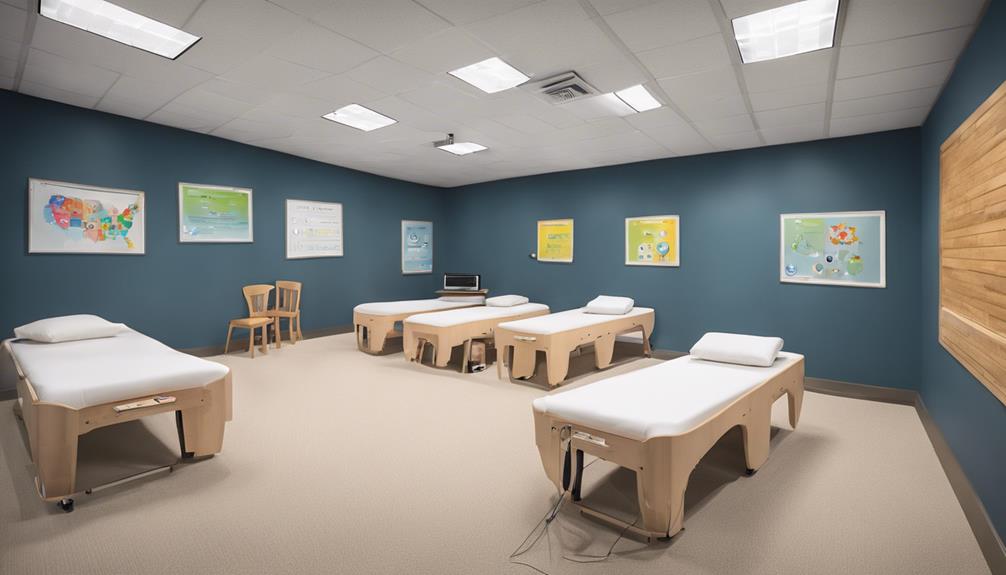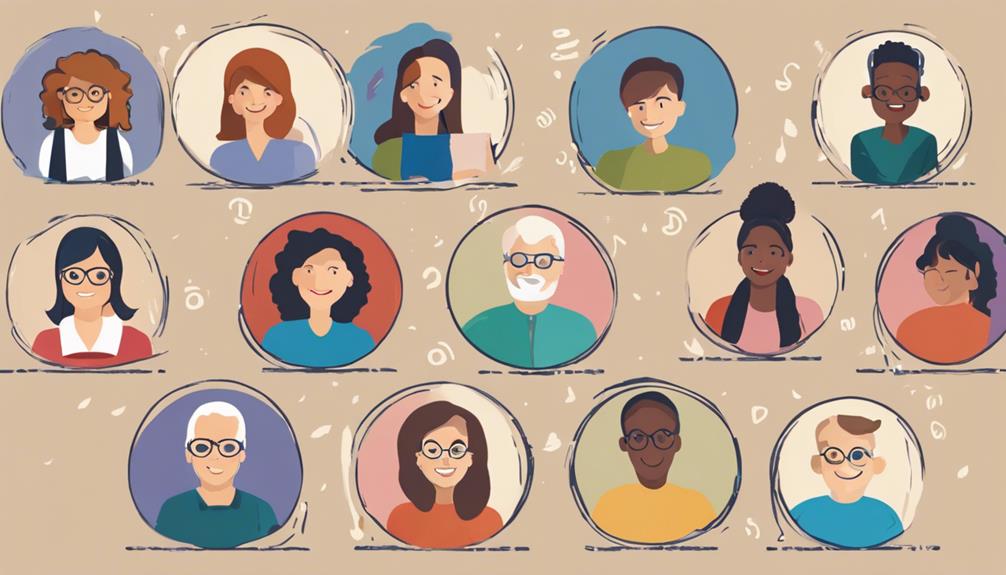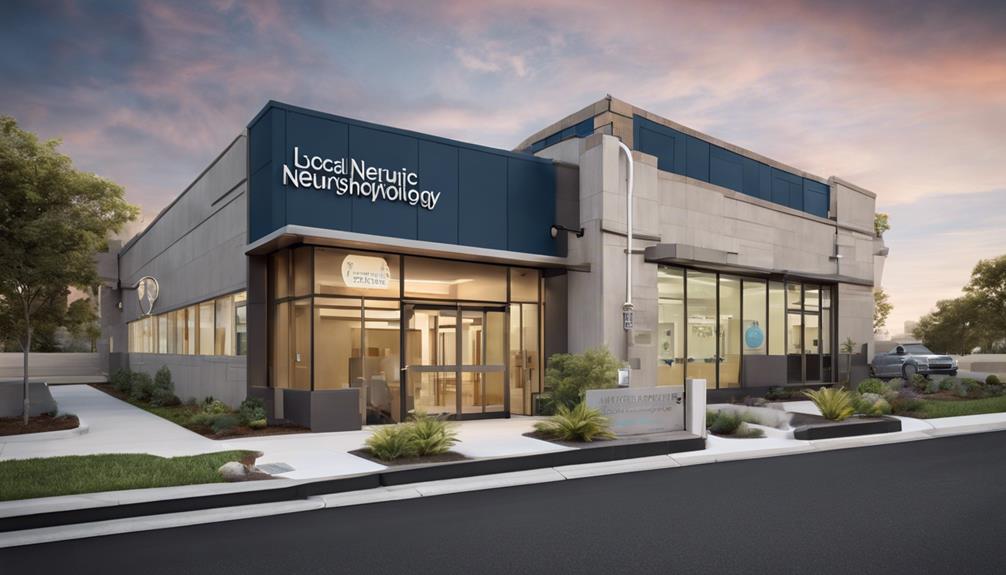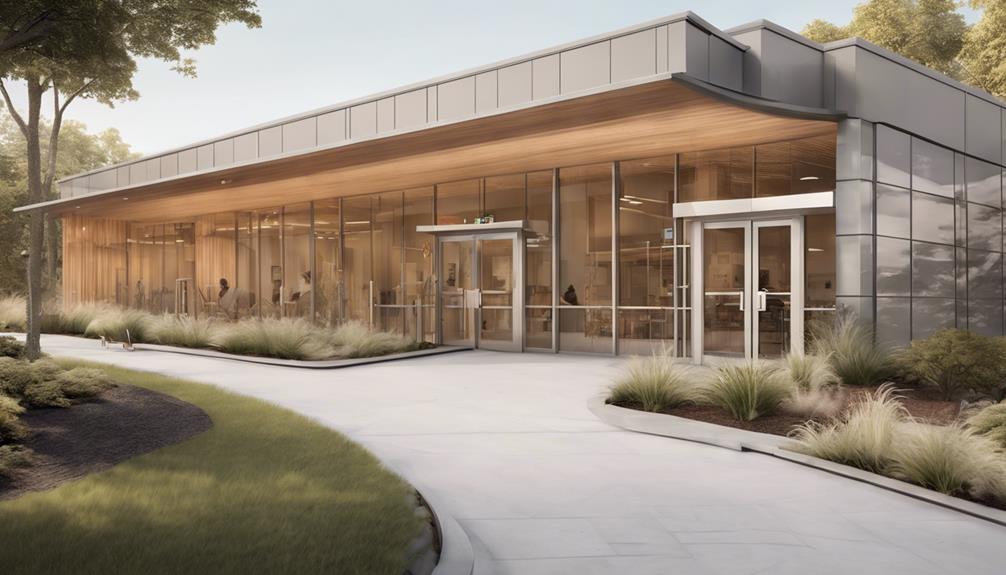Have you ever thought about what therapy options for auditory processing disorder are available nearby?
There are various therapeutic avenues that aim to enhance auditory processing skills and communication abilities for individuals with APD.
Understanding these options can be pivotal in improving daily interactions and navigating challenging auditory environments.
Key Takeaways
- Local therapists and specialized centers offer evidence-based techniques for auditory processing disorder.
- Auditory training programs and online exercises are accessible for improving auditory processing skills.
- Hearing aid services and sensory integration therapy focus on enhancing sound processing.
- Cognitive-behavioral therapy centers create customized plans to manage anxiety and stress related to APD.
Local Auditory Processing Disorder Therapists
When seeking therapy for auditory processing disorder, individuals can benefit from connecting with local therapists who specialize in tailored programs to improve auditory processing skills. Auditory Processing Disorder therapists offer evidence-based techniques designed to enhance sound recognition, speech clarity, and language comprehension in both children and adults. These therapists work closely with clients to develop compensatory strategies that improve communication in various environments.
Therapy sessions with Auditory Processing Disorder therapists often involve comprehensive assessments to identify specific needs and challenges. Based on these assessments, personalized treatment plans are created to address individual goals effectively. Furthermore, these therapists provide ongoing support to help individuals with auditory processing disorder make continuous progress and improvements.
Specialized APD Therapy Centers

Connecting with specialized APD therapy centers offers children with APD tailored treatment plans to address their unique auditory processing challenges. These centers provide a range of services aimed at improving auditory processing abilities and enhancing overall communication skills.
Here are some key features of specialized APD therapy centers:
- Expert Evaluation: Professionals at these centers conduct thorough evaluations to understand the specific auditory processing difficulties faced by each child with APD.
- Tailored Therapy Options: Therapy plans at specialized APD centers may include auditory training, speech and language therapy, and counseling, all customized to meet the individual needs of children with APD.
- Specialized Techniques: Therapists utilize specialized tools and techniques designed to enhance sound processing and comprehension in children with APD, leading to improved quality of life and communication abilities.
Nearby Speech and Language Clinics
Speech and language clinics nearby provide specialized therapy options for individuals with Auditory Processing Disorder, tailored to their specific needs. These clinics offer personalized treatment plans designed to address the unique challenges that come with APD.
At these clinics, trained speech-language pathologists work closely with patients to improve their communication skills and enhance their ability to process auditory information effectively. Therapy options may include a variety of techniques such as sound discrimination exercises, language processing activities, and auditory memory training.
Accessible Auditory Training Programs

When exploring accessible auditory training programs, we find options like:
- Online auditory exercises
- In-person therapy sessions
- Home-based listening activities
These programs can be tailored to individual needs and offer a variety of exercises to improve auditory processing skills.
Online Auditory Exercises
Online auditory exercises offer individuals with auditory processing disorder convenient and accessible auditory training programs to enhance sound discrimination, auditory memory, and language processing skills through interactive exercises. These programs can be beneficial for individuals seeking to improve their auditory abilities in the comfort of their own homes. Here are three key benefits of online auditory exercises:
- Flexibility: Participants can engage in therapy sessions at their convenience, fitting them into their schedules.
- Progress Tracking: Individuals can monitor their advancements in auditory skills over time, providing motivation and insight into areas for improvement.
- Targeted Activities: Accessible auditory training programs offer targeted exercises to address specific auditory processing challenges, facilitating personalized growth.
In-Person Therapy Sessions
Accessible auditory training programs through in-person therapy sessions offer tailored and personalized approaches to enhancing sound discrimination, auditory memory, and language processing skills for individuals with auditory processing disorder (APD). These sessions, conducted by trained professionals, aim to improve hearing abilities and speech comprehension in individuals with APD.
By providing a structured environment for consistent practice and progress monitoring, in-person therapy sessions ensure regular support and guidance for managing auditory processing disorder effectively. Convenient locations make it easier for individuals to access these beneficial programs, which focus on honing specific auditory skills crucial for daily communication and learning.
Through targeted auditory exercises and expert supervision, individuals with APD can experience gradual improvements in their ability to process sounds and speech.
Home-Based Listening Activities
Enhancing auditory processing skills through home-based listening activities offers individuals with auditory processing disorder personalized and convenient ways to improve sound discrimination, auditory memory, and language processing skills in familiar environments.
Benefits of Home-Based Listening Activities for APD:
- Accessibility: Programs provide accessible auditory training for individuals with APD at home.
- Personalization: Tailored listening exercises target specific auditory processing challenges.
- Convenience: Practice listening and speech understanding in comfortable surroundings.
Home-based auditory training not only enhances communication abilities but also supports academic and social development in individuals with auditory processing disorder.
These activities can be a valuable addition to traditional therapy sessions, offering continuous support and improvement in daily auditory challenges.
Community-Based APD Support Groups

How can community-based APD support groups benefit individuals with auditory processing disorder?
Community-based APD support groups offer a valuable platform for individuals grappling with auditory processing disorder (APD) to connect, share experiences, and learn coping strategies. These groups provide not only emotional support but also practical advice and a sense of belonging to those affected by APD.
By participating in APD support groups, individuals can gain insights into new therapy options, techniques, and resources shared by fellow members. Meetings often feature guest speakers, workshops, and educational sessions that aim to enhance understanding and management of APD.
Joining a community-based APD support group can help individuals feel empowered, reduce feelings of isolation, and contribute to an overall improvement in well-being. The camaraderie and knowledge exchange within these groups can significantly impact the lives of those navigating the challenges of auditory processing disorder.
Affordable Hearing Rehabilitation Services

When exploring affordable hearing rehabilitation services, individuals can expect to find:
- Cost-effective treatment options
- Accessible hearing aid services
- Community support programs
These services aim to provide therapy for auditory processing disorder through:
- Speech and language therapy
- Auditory training
- Counseling
- Enhancing communication skills
Providers often offer:
- Flexible payment plans
- Sliding scale fees
- Acceptance of insurance or Medicaid
This ensures individuals have access to the necessary auditory processing therapy.
Cost-Effective Treatment Options
Cost-effective options for auditory processing disorder therapy include various affordable hearing rehabilitation services such as speech and language therapy, auditory training, and counseling. When seeking affordable treatment for auditory processing disorder, consider the following options:
- Group therapy sessions: Engaging in group activities with individuals facing similar challenges can provide cost-effective support and therapy.
- Online programs: Accessing auditory processing disorder therapy online can be a convenient and affordable way to receive treatment.
- Community resources: Utilizing resources offered by non-profit organizations, university clinics, or community health centers can provide reduced-cost or free therapy services.
Exploring these avenues could lead to effective and budget-friendly options for managing auditory processing disorder.
Accessible Hearing Aid Services
Accessible Hearing Aid Services provide tailored solutions for individuals with auditory processing disorders, focusing on enhancing sound processing and speech clarity to improve communication skills. These services offer cost-effective options such as hearing aids and rehabilitation programs, aiming to address auditory processing difficulties effectively.
With personalized fittings and adjustments, users can experience optimal performance and comfort. Additionally, counseling and support are available for individuals and families navigating the challenges associated with auditory processing disorders.
Community Support Programs
Our community support programs provide valuable resources and tailored therapy options for individuals with auditory processing disorders, focusing on enhancing communication skills and social interaction. These programs offer a range of services to support individuals with APD, including:
- Group therapy sessions to practice communication strategies and improve auditory processing abilities.
- Educational workshops to learn more about auditory processing disorders and how to manage them effectively.
- Counseling sessions to address emotional well-being and provide support for individuals with APD.
Participating in these community programs can complement other interventions like hearing aid use, offering a holistic approach to improving auditory processing skills and enhancing overall quality of life.
Convenient Auditory Processing Workshops

Convenient auditory processing workshops offer engaging activities and practical strategies to enhance sound recognition and processing skills for individuals with Auditory Processing Disorder (APD). These workshops provide interactive sessions that may include group exercises, auditory games, and educational discussions on coping strategies specific to APD challenges. Participants can actively participate in hands-on learning experiences aimed at improving auditory discrimination and comprehension abilities.
The workshops create a supportive setting where individuals with APD can practice communication and listening techniques in a comfortable environment. Expert guidance, personalized feedback, and effective tools are provided to help manage auditory processing difficulties efficiently. By attending these workshops, individuals can benefit from a holistic approach to addressing APD, gaining valuable skills and knowledge to navigate daily auditory challenges with confidence and competence.
Proximity to APD Educational Workshops

Exploring the availability of educational workshops on auditory processing disorder (APD) within a 20-mile radius can provide valuable insights into managing the condition effectively and accessing essential resources in the local community. When considering workshops near you, here are some key points to keep in mind:
- Expert Guidance: Workshops often feature presentations from specialists in APD, offering expert guidance on understanding the disorder and implementing effective strategies.
- Hands-On Learning: These workshops may include interactive activities that allow participants to engage with different techniques and tools for managing APD.
- Networking Opportunities: Attending workshops can connect you with other individuals facing similar challenges, creating a supportive network for sharing experiences and resources.
Participating in these educational workshops not only deepens your understanding of APD but also equips you with practical skills to support yourself or your loved ones effectively.
Don't miss out on the opportunity to access valuable information and connect with a community that understands your journey.
Close-by Sensory Integration Therapy

At our clinic, we've seen how Sensory Integration Therapy offers significant benefits for those with Auditory Processing Disorder. Therapists utilize various tools like listening exercises and interactive tasks to enhance auditory processing skills.
Our specialized therapists bring expertise and a tailored approach to help individuals improve communication and overall functioning.
Sensory Integration Benefits
Enhancing sensory processing skills through sensory integration therapy can greatly benefit individuals with auditory processing disorder, improving their ability to interpret and respond to sensory input. When considering sensory integration therapy benefits, individuals may experience:
- Improved Focus: Enhancing sensory processing can lead to better concentration and attention.
- Increased Attention: Individuals may find it easier to stay focused on tasks and conversations.
- Enhanced Sensory Processing Skills: Through targeted activities, individuals can improve how they process and respond to sensory stimuli.
These benefits can significantly impact individuals with auditory processing challenges, helping them navigate daily tasks with greater ease and confidence. Close-by sensory integration therapy centers offer tailored programs to support individuals in enhancing their sensory processing abilities.
Therapeutic Tools Used
Utilizing a variety of therapeutic tools, close-by sensory integration therapy centers offer personalized programs tailored to address specific auditory processing challenges in individuals with auditory processing disorder (APD). These tools may include weighted blankets, sensory bins, auditory feedback devices, and tactile sensory toys. By engaging in activities that stimulate the senses, individuals with APD can improve their processing abilities.
These therapy options aim to enhance sensory processing, promote attention and focus, and improve communication skills. Through sensory integration therapy, individuals with auditory processing disorder can better navigate sensory information, leading to improved daily functioning. The personalized approach of these programs ensures that each individual's unique needs and challenges are addressed effectively, offering hope for a brighter auditory future.
Expertise of Therapists
Therapists specializing in sensory integration therapy nearby possess the expertise required to effectively address auditory processing disorder and improve sensory processing and integration for individuals seeking assistance. When considering therapy options for APD, it's essential to trust in the skills of these professionals. Here's why you should consider their expertise:
- Personalized Treatment Plans: Therapists with experience in sensory integration therapy can tailor treatment plans to target specific auditory processing challenges.
- Enhanced Sensory Processing: Sensory integration therapy focuses on enhancing the brain's ability to organize sensory information, benefiting individuals with APD.
- Improved Quality of Life: By improving communication and social interactions, sensory integration therapy aims to enhance the overall quality of life for individuals with auditory processing disorder.
Neighboring Occupational Therapy Providers

When exploring neighboring occupational therapy providers for auditory processing disorder therapy, individuals can expect tailored interventions focused on enhancing sensory processing and language skills. These providers specialize in working with children to improve attention, communication, and auditory processing abilities affected by APD.
By utilizing evidence-based techniques, occupational therapists help children develop strategies to better comprehend and respond to auditory information. Through structured sessions, individuals with APD can make significant progress in managing symptoms and enhancing daily functioning.
Occupational therapy not only targets the core challenges of APD but also aims to improve overall quality of life by fostering independence and confidence in children. Collaborating with occupational therapy providers can provide valuable support and guidance for both children and their families in navigating the complexities of auditory processing disorder.
Local Neuropsychology Clinics

At local neuropsychology clinics, individuals can access specialized therapy tailored to address auditory processing disorder. These clinics house professionals equipped with the expertise to assess and treat cognitive and neurological issues related to APD.
Through cognitive training, auditory exercises, and personalized treatment plans, individuals can receive targeted care to improve their auditory processing difficulties.
Clinic Services Offered
Local neuropsychology clinics offer a range of specialized therapy options tailored to address auditory processing disorder (APD) and improve sound interpretation. These services are designed to meet the unique needs of individuals struggling with APD challenges.
Here are some of the key services provided:
- Auditory Training: Clinics offer programs to enhance auditory skills and help individuals better process and interpret sounds.
- Cognitive Therapy: Therapists utilize cognitive exercises to improve attention, memory, and problem-solving skills related to auditory processing.
- Speech-Language Therapy: This therapy focuses on improving language and communication abilities to boost overall auditory processing abilities.
At these clinics, evidence-based approaches are used to create personalized treatment plans that target specific APD symptoms, ultimately leading to improved quality of life and social interactions.
Therapist Qualifications
Therapists at local neuropsychology clinics specializing in auditory processing disorder possess advanced degrees in neuropsychology, psychology, or related fields, equipping them with the expertise needed to effectively evaluate and address cognitive and auditory processing deficits.
| Therapist Qualifications | Description |
|---|---|
| Education | Advanced degrees in neuropsychology, psychology, or related fields |
| Expertise | Specialized in evaluating and treating auditory processing challenges |
| Therapeutic Approaches | Cognitive training, auditory discrimination exercises, and personalized interventions |
| Evidence-Based Practices | Cognitive-behavioral therapy, auditory processing training, multisensory interventions |
| Personalized Care | Comprehensive assessment and individualized therapy plans for effective APD treatment |
Patients can feel confident in the specialized skills and personalized care provided by these qualified therapists at local neuropsychology clinics to address auditory processing disorder effectively.
Accessible Cognitive Behavioral Therapy Centers

Accessible centers specializing in Cognitive Behavioral Therapy (CBT) for auditory processing disorder offer tailored strategies to enhance coping mechanisms and communication skills. These centers focus on changing negative thought patterns and behaviors related to auditory processing challenges, providing individualized treatment plans to improve coping strategies.
Here are three key benefits of accessing CBT centers for auditory processing disorder:
- Personalized Treatment Plans: CBT centers create customized plans to address the specific needs of individuals with auditory processing disorder, helping them develop effective coping mechanisms and communication strategies.
- Effective Management of Symptoms: CBT has been proven to be effective in managing anxiety, stress, and social difficulties associated with auditory processing disorder, offering practical tools to navigate daily challenges.
- Skill Development: Accessible CBT centers empower individuals with auditory processing disorder to learn new skills and techniques that can enhance their quality of life and improve their overall well-being.
Nearby Music Therapy Options

For individuals seeking supportive interventions for auditory processing disorder, exploring nearby music therapy options can offer valuable opportunities for improving sound recognition and processing skills. Music therapy has been recognized as a beneficial intervention for individuals with auditory processing disorder (APD), as it can help enhance their ability to recognize and process sounds effectively.
Many clinics and centers offer specialized music therapy programs designed to support individuals with auditory processing difficulties. These programs may include a variety of activities such as rhythm exercises, listening activities, and vocal exercises tailored to meet the unique needs of each individual with APD.
Music therapy provides a fun and engaging way to work on auditory processing skills while enjoying the therapeutic benefits of music. By participating in music therapy sessions, individuals with APD can work towards improving their auditory processing abilities in a supportive and creative environment.
Proximity to APD Teletherapy Services

Exploring options for auditory processing disorder therapy can now expand to considering the convenience and benefits of proximity to APD teletherapy services. When looking for APD teletherapy services near you, consider the following:
- Convenient Access: APD teletherapy services offer the convenience of receiving therapy from the comfort of your own home. This eliminates the need to travel to a physical location, saving you time and effort.
- Wide Range of Expertise: Providers of APD teletherapy can be located nationwide, offering a diverse range of expertise and experience. This allows you to choose a therapist that best fits your needs and preferences.
- Interactive Treatment Sessions: Teletherapy services for APD utilize technology to engage patients in interactive and effective treatment sessions. Through these sessions, you can work on improving your auditory processing skills in a dynamic and engaging way.
Accessing APD therapy through teletherapy can be a game-changer, breaking down barriers to traditional in-person treatment and helping you enhance your auditory processing abilities effectively.
Frequently Asked Questions
What Is the Best Treatment for Auditory Processing Disorder?
When addressing Auditory Processing Disorder (APD), the best treatment typically involves a multidisciplinary approach. It may include speech and language therapy, auditory training, and assistive devices tailored to specific challenges in sound processing and language comprehension.
Options like auditory rehabilitation, sound discrimination exercises, cognitive therapy, and environmental modifications can enhance listening abilities. Early intervention is key for effective management, especially in children, and collaborating with professionals can create a comprehensive treatment plan.
Which Professionals Are Qualified to Treat Auditory Processing Disorder?
When it comes to treating auditory processing disorder, various professionals are qualified to help. Audiologists, speech-language pathologists, educational psychologists, occupational therapists, and neurologists all play essential roles. Each brings unique expertise to address different aspects of APD.
Working together, this team can provide comprehensive support tailored to the individual's needs. Trust that with the right specialists, there are effective strategies and therapies available to improve auditory processing skills.
What Are the 4 Types of Auditory Processing Disorder?
Sure!
Auditory Processing Disorder (APD) manifests in four types: decoding, tolerance-fading memory, integration, and organization.
Decoding APD involves struggles with recognizing speech sounds accurately.
Tolerance-fading memory APD impacts the ability to remember and process sounds over time.
Integration APD relates to challenges in combining auditory information.
Lastly, organization APD causes difficulties in organizing and making sense of auditory input.
These distinctions help tailor therapy approaches to address specific APD manifestations.
Who Treats Auditory Processing Disorder in Adults?
When it comes to treating auditory processing disorder in adults, a team of professionals can help.
Audiologists, speech-language pathologists, neurologists, psychologists, and occupational therapists all play vital roles in addressing adult APD.
With tailored therapy plans, targeted interventions, neurological management, emotional support, and compensatory strategies, we work together to improve auditory processing skills and enhance daily life for individuals dealing with APD.
What Are the Different Auditory Processing Disorder Therapy Options Available Near Me?
If you are seeking therapy options for auditory processing disorder near you, consider exploring auditory integration therapy benefits. Many therapy centers offer this specialized treatment to help improve auditory processing and communication skills in those with APD. Research local options to find the best fit for your needs.
Conclusion
In conclusion, exploring auditory processing disorder therapy options near us can lead to improved communication and cognitive abilities. By seeking out local therapists, specialized centers, and accessible programs, we can enhance our skills in distinguishing sounds and navigating noisy environments.
Additionally, joining support groups and utilizing teletherapy services can provide valuable resources for managing APD challenges. Embracing these opportunities can lead to significant progress in our auditory processing skills and overall quality of life.











